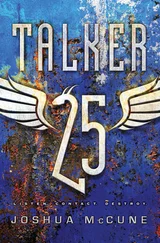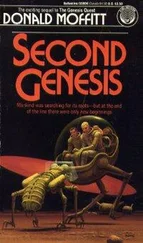In the late twentieth century, «miracle» had become the commonplace description for home appliances and food additives. Then came the Global Civil War, a rapid spiraling of diverse conflicts that, by 1994, was well on its way to becoming a full-scale worldwide struggle; in the very early days of the war, «miracle» was used by either side to represent any highly encouraging battle news.
The World Unification Alliance came into existence because it seemed the best hope for human survival. But its well-meaning reformers found that a hundred predators rose up to savage them: from supranational conglomerates, religious extremists, and followers of a hundred different ideologies to racists and bigots of every stripe.
The war bogged down, balkanized dragged on, igniting every corner of the planet. People forgot the word "miracle." The war escalated and escalated-gradually, it's true, but everyone knew what the final escalation would be-until hope began to die.
And in a way nobody seemed to be able to stop, the human race moved along the path to its own utter obliteration, using weapons of its own fashioning. The life of the planet was infinitely precious, but no one could formulate a plan to save it from the sacrificial thermonuclear fire.
Then, almost ten years into the Global Civil War, the thinking of Homo sapiens changed forever.
The dimensional fortress's arrival was a coincidence beyond coincidence and, in the beginning, a sobering catastrophe.
Its entry was that of a powered object, and it had appeared from nowhere, from some unfathomable rift in the timespace continuum. Its long descent spread destruction and death as its shock waves and the after-blast of its monumental drive leveled cities, deafened and blinded multitudes, made a furnace of the atmosphere, and somehow awakened tectonic forces. Cities burned and fell, and many, many died.
Its approach rattled the world. The mosques were crowded to capacity and beyond, as were the temples and the churches. Many people committed suicide, and, curiously enough, the three most notable high-casualty-rate categories were, in this order: fundamentalist clergy, certain elected politicians, and major figures in the entertainment world. Speculation about their motives-that the thing they had in common was that they felt diminished by the arrival of the alien spacecraft-remained just that: speculation.
At last the object slowed, obviously damaged but still capable of maneuvering. Its astonishing speed lessened to a mere glide-except that it had little in the way of lifting surfaces and was unthinkably heavy. It came to rest on a gently sloping plain on a small island in the South Pacific, once the site of French atomic tests, called Macross.
The plain was long and broad, especially for such a tiny island, but it was not a great deal longer than the ship itself. A few hundred yards behind its thrusters, waves crashed against the beach. A short distance ahead of its ruined bow were sheer cliffs.
Its outer sheath and first layers of armor, and a great portion of the superstructure, had been damaged in the course of its escape, or in the controlled crash of its landing. It groaned and creaked, cooling, as the combers foamed and bashed the sand on an otherwise idyllic day on Macross Island.
The human race began assessing the damage in a dazed, uncoordinated way. But it didn't take long for opposing forces to convince themselves that the crash was no enemy trick.
For the first few hours, it was called "the Visitor." Leaders of the various factions of the civil war, their presumed importance reduced by the alien vessel's appearance, took hasty steps toward a truce of convenience. The various commanders had to move quickly and had to sacrifice much of their prestige to accommodate one another; all eyes were turned to the sky and to Macross Island. The Global Civil War looked like a minor, ludicrous squabble compared to the awesome power that had just made itself felt on Earth.
Within hours, preparations were being made for an expedition to explore the wreckage. Necessary alliances were struck, but safety factors were built into the expeditionary force. Enemies at the top had accomplished an uneasy peace.
Now, those who'd fought the war would have to do the same.
The flight deck of the Gibraltar-class aircraft carrier Kenosha retreated beneath the ascending helicopter, a comforting artificial island of nonskid landing surface. Lieutenant (jg) Roy Fokker watched it unhappily, resigning himself to the mission at hand.
He turned to the man piloting the helo, Colonel T.R. Edwards, who was flying the chopper with consummate skill. Roy Fokker was more used to those occasions when he and Edwards were doing turns-and-burns, trying to shoot each other out of the skies.
Roy Fokker was an Internationalist, right down to his soles. His uniform bore the colors of his carrier aviation unit, a fighter squadron: the Jolly Roger skull-and-crossbones insignia. The colors were from the old United States Navy, the renowned and justly feared VF-84 squadron off the USS Nimitz that had hunted the skies in F-14 Tomcats, then Z-6 Executioners, right up to Roy's own production-line-new Z-9A Peregrine.
Roy wished he was back there in his own jet, in his own cockpit.
For so important a takeoff, it would have been normal to see the Kenosha 's skipper on the observation deck under phased-array radar antenna and other tower shrubbery-the deck the aviators called Vulture's Row. Admiral Hayes and the other heavy-hitters were all there, but Captain Henry Gloval wasn't. Today, Captain Henry Gloval was belted in the rear of the helo with a platoon of marines and some techs and more scientific equipment and weapons than Roy had seen packed into a bird before. That the Old Man should actually leave his command and go ashore showed how topsy-turvy this spaceship or whatever it was had turned matters on Earth.
It was as oddball a mission as Roy had ever seen; it made him uncharacteristically nervous, especially since the opposition junta had picked Edwards as its representative on the team.
The last time Edwards and Roy had crossed contrails, Edwards had been in the hire of something called the Northeast Asian Co-Prosperity Sphere. There was no telling who he was really working for now, except that he was always , without exception, out to benefit Colonel T.R. Edwards.
Roy told himself to stop thinking about it and do his job. He fidgeted in his seat a little, uncomfortable in web gear weighted with about a hundred rounds of weapons, ammo, and survival and exploration equipment.
He pushed his unruly mop of blond hair back out of his eyes. He wasn't sure why or when long hairstyles had become the norm among pilots, but now it was practically de rigueur. Some Samurai tradition?
He glanced over at Edwards. The mercenary was perhaps thirty, ten years older than Roy, with the same lean height. Edwards had tan good-looks and sun-bleached hair and a killer smile. He seemed to be enjoying himself.
Roy's youth didn't make him Edwards's inferior in combat experience or expertise. The practical philosophy of the old-time Swiss and Israelis and others like them was now the rule: Anyone who could fly well did, and they flew as leaders if they merited it, regardless of age or rank.
All the tea-party proprieties about a flyer needing a college education and years of training had been thrown out as the attrition of the war made them untenable. Roy had heard that kids as young as fourteen were in the new classes at Aerial Combat School.
Edwards had caught the glance. "Want to take over, Fokker? Be my guest."
"No thanks, Colonel. I'm just here to make sure you don't mess up and spike us into the drink."
Читать дальше












